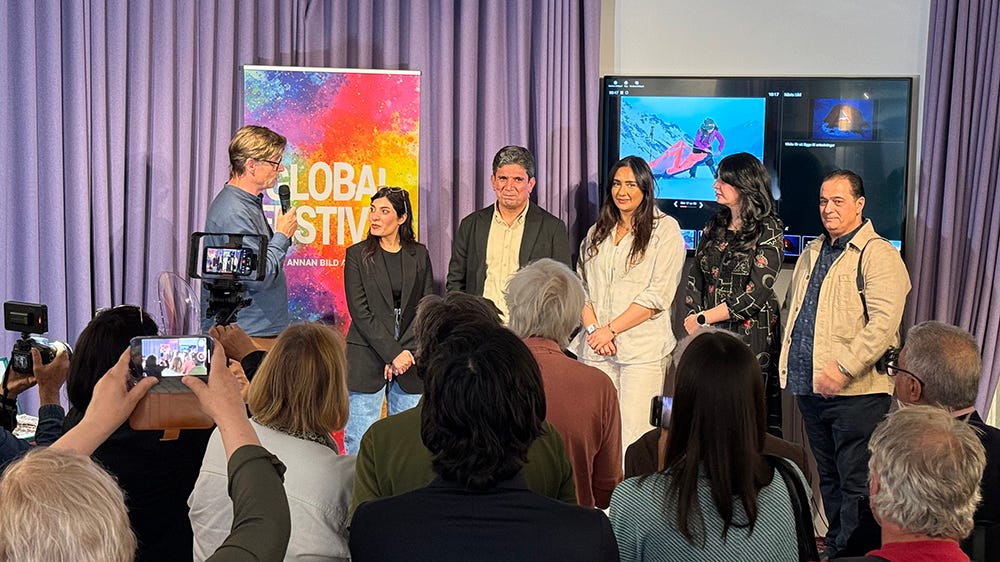Development Sweden #38. Water Institute SIWI Goes Down the Drain
A newsletter on Swedish development cooperation and policy
Stockholm International Water Institute (SIWI), which is behind both the Stockholm Water Prize and World Water Week, is being shaken to its core. Will the prestigious institution survive the misshandling by the politicians in the municipality in Stockholm?
Also in this issue – updates on the Swedish government’s cuts in aid budget which have resulted in many NGO’s making drastic cuts in staff. And is it all the government’s fault? Comment from our Editor-in-Chief.
But first, a few words about what happened at the Global Festival.
If you would like to read the full newsletter you are most welcome to upgrade to a paid subscription. Thank you for joining Development Sweden and supporting our work so that we can continue to deliver insight in Swedish development cooperation and policy.
David Isaksson
Editor-in-Chief, Global Bar Magazine
Monika Gutestam Hustus
Editor, Development Sweden
What do you think we should write more about? Please give us feedback and suggestions.
Write to:
david@globalreporting.net
mgutestam@aol.com
For subscription related issues, contact:
lisa@globalreporting.net
Our headlines
Success for Global Festival!
Water Institute SIWI Goes Down the Drain
Civil Society: Sida Delays Decision on Partnership Agreements
No, it’s not all the government’s fault
IM Cuts Back – To Manage Without Sida Funding

Success for Global Festival!
Full house, intense, engaging. There has been great interest in the discussions held so far during the Global Festival. You can now watch all the discussions on Facebook afterwards.
Global Festival began with a packed discussion on international humanitarian law, can it even survive the Gaza War? The panelists discussed how selective this part of international law can be. When does international law protect civilian populations and civilian targets in reality? Ylva Strömberg from Médecins Sans Frontières highlighted that in Sweden, there is extensive confusion that could actually be disastrous for us if there is ever war.
You can find broadcasts of all discussions on Global Bar Magazine’s Facebook page.
Photographers from Iraq
An important part of the Global Festival has been the exhibition featuring female photographers from Iraq, which has also received significant attention in other media. On the first evening, a panel discussion was held with DN photographer Anette Nantell, the project's mentor. One of the points discussed was the importance of female photographers and journalists if women’s stories are to be visible. You can watch the discussion afterwards. Later in the week, photographer Enas Hassan discussed her reportage on Jouza Ahmed, the first female village chief in Iraq.
A conversation with documentary photographer Saba Kareem highlighted the challenges of working as a female photographer in Iraq. She has followed Marwah Al-Naimi, a female engineer and entrepreneur. ”She is the only woman among a large number of male engineers and faces strong resistance,” said Saba Kareem.
Raw materials in Latin America, apple pie in Belarus
Can Latin America become the world's sole raw material superpower? There is a race for the natural resources needed for the green transition, many of which are found in Latin America. The discussion included Lena Sellgren, Chief Analyst at Business Sweden.
What role does art play in resistance, and why are totalitarian regimes so afraid of artists? In the discussion ”Belarus: Resistance and Apple Pie,” Ludmila Christeseva talked about a new way of resisting, while Dmitri Plax emphasized the importance of art asking questions rather than providing answers.
Important to meet
As important as the discussions themselves have been the conversations that have taken place after the seminars and the new contacts that have been made. Because even though much can be done digitally, it is a completely different matter to meet – also for the panelists. Another important aspect has been to raise industry issues such as how aid can be improved with the help of AI – but also the risks that technology entails.
Many want to know more about Gaza
The discussion on the Gaza War was also packed, where Fia Iveslätt, a nurse with Médecins Sans Frontières, described her work on site during April and May 2024.
”The terrible images we see in the media correspond to what it looks like on the ground,” she said. You can watch the discussion afterwards.
Changing the image of Sweden
Has the Gaza War, Quran burnings, and the termination of many aid agreements affected Sweden's image – and if so, how? The image of Sweden has deteriorated in parts of North Africa, the Middle East, and Asia, but over time it remains relatively stable, noted Anna Rudels from the Swedish Institute.
Activists making a difference
The lunch seminar ”Ukraine – Making a Big Difference in the Small” focused on Swedish organizations, activists, and volunteers making a difference in Ukraine. ”In eastern Ukraine, there are constant rocket attacks at night,” said Stig Löfgren from Swedish Rescuers who has been on site. Watch the event afterwards here.
How should the union handle globalization?
The discussion ”Why are companies so afraid of workers?” focused on why labor rights are undermined. Trenton Elsley, Executive Director of the Labour Research Service (LRS) in South Africa, emphasized that trade unions must do better in representing the interests of young people.
What's happening in South Africa now?
The conversation ”Can the new government solve South Africa’s problems?” discussed the lack of human rights, massive unemployment, and the ANC's need for coalition partners to govern. ”The inequality and desperation among so many unemployed youth have not been addressed by politicians,” said Kaj Persson, former diplomat.
Keep reading with a 7-day free trial
Subscribe to Development Sweden to keep reading this post and get 7 days of free access to the full post archives.




